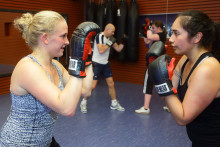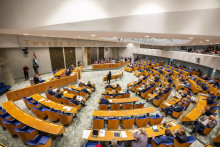People who enter the academic world after obtaining their PhD usually work as a postdoc for a while. The next step up the ladder is a position as an assistant professor, also known as university lecturer. For them, a new national network organisation was recently established: APNet.
APNet secretary Rifka Vlijm, a biophysicist at the University of Groningen, hopes the new network will be a source of support to its members. In only a short time, 80 have already joined.
Why do we need a national network for assistant professors?
‘There are other networks for people in the academic world, but assistant professors are a distinct group. They find themselves confronted with a lack of clarity on all kinds of issues, from research funding to what their employers expect of them. Each university interprets this job category in its own way, and that leads to confusion. As a result, we often don’t know where we stand. That certainly applies to the many colleagues who have come to the Netherlands from abroad.’
Why do they need more help than others?
‘They often have to get to grips with all kinds of things when it comes to regulations and working in the Netherlands in general. APNet wants to help them and bring them together.’
How do you intend to represent your members?
‘We can act as a sounding board, a body which universities, the Ministry of Education, Culture and Science (OCW) and the Dutch Research Council (NWO) can consult if they want to know what we think about certain policies. Currently, we are not well represented.’
Do you resemble a union?
‘We are not a union and we play no part in the collective negotiations for university staff. A union focuses on contracts, salaries and working conditions. But it doesn’t look at the differences in the working environment that assistant professors experience at different universities or the funding conditions set by the Dutch Research Council. And as assistant professors, these are things we find ourselves dealing with.’
So how do you plan to help your members?
‘We can support each other in applying for funding, and many more issues besides. At this stage in your career, you often have to lead a project or manage a group of teaching staff for the first time. In positions like that, it helps if you can share your experiences. We also want to put together a database that will make it easier to find researchers for consortia within a given field. In addition, we aim to organise information sessions, for example to explain how the collective labour agreement affects assistant professors.’
Postdocs often struggle with temporary contracts. Is that an issue that affects you too?
‘Yes, it is. Many assistant professors have temporary contracts of four to six years. This constant uncertainty can have such a harmful effect, eating up mental capacity that you could otherwise have devoted to research or teaching.’
How can your members connect?
‘We have set up a website and online environment. These are platforms where new members can sign up and also get to know each other.’






